Gerontological nursing 4e - Study guides, Class notes & Summaries
Looking for the best study guides, study notes and summaries about Gerontological nursing 4e? On this page you'll find 80 study documents about Gerontological nursing 4e.
Page 3 out of 80 results
Sort by
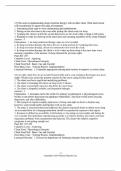
-
Gerontological Nursing, 4e (Tabloski) Chapter 8 Sleep and the Older Adult
- Exam (elaborations) • 17 pages • 2024
-
- $10.49
- + learn more
Gerontological Nursing, 4e (Tabloski) Chapter 8 Sleep and the Older Adult 1) The nurse is caring for an older client who is experiencing sleep deprivation due to a prolonged stay in intensive care. Which manifestation is the nurse most likely to observe in this client? 1. Constant fatigue 2. Gustatory hallucinations 3. Increased activity 4. Need for repeated instructions Answer: 4 Explanation: 1. Daytime fatigue is more likely in the client with sleep deprivation. 2. Th...
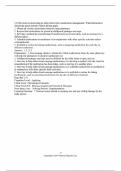
-
Gerontological Nursing, 4e (Tabloski) Chapter 6 Pharmacology and Older Adults
- Exam (elaborations) • 20 pages • 2024
-
- $10.99
- + learn more
Gerontological Nursing, 4e (Tabloski) Chapter 6 Pharmacology and Older Adults 1) An older client being treated for pneumonia is given a sedative to sleep. A few hours afterwards, the client has a respiratory rate of 12 and cannot be aroused. What does this assessment finding indicate to the nurse? 1. The sedative was not absorbed. 2. The sedative has reached a therapeutic blood level. 3. The medication for sleep caused excessive sedation. 4. The client is experiencing complicat...
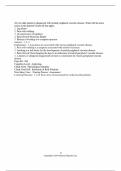
-
Gerontological Nursing, 4e (Tabloski) Chapter 15 The Cardiovascular System
- Exam (elaborations) • 16 pages • 2024
-
- $10.99
- + learn more
Gerontological Nursing, 4e (Tabloski) Chapter 15 The Cardiovascular System 1) An older female patient experiences fatigue and nausea, is not sleeping well, and makes a vague complaint of intermittent chest discomfort. How should the nurse interpret these symptoms? 1. Signs of anemia 2. Pancreatic disease 3. Myocardial infarction 4. Normal changes of aging Answer: 3 Explanation: 1. Anemia would present with fatigue but not with nausea or chest discomfort. 2. Pancreatic d...
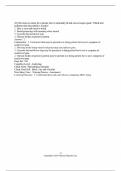
-
Gerontological Nursing, 4e (Tabloski) Chapter 11 Care at the End of Life
- Exam (elaborations) • 17 pages • 2024
-
- $10.99
- + learn more
Gerontological Nursing, 4e (Tabloski) Chapter 11 Care at the End of Life 1) An older patient with terminal cancer is considering hospice care but is concerned that Medicare will stop payments if the care is provided for longer than 6 months. What can the nurse respond to this patient? Select all that apply. 1. Medicare does not limit the hospice benefit. 2. Medicare regulations discourage a longer use of the benefit. 3. Hospice costs more than traditional hospital or long-term ca...
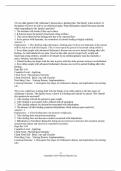
-
Gerontological Nursing, 4e (Tabloski) Chapter 22 The Neurologic System
- Exam (elaborations) • 16 pages • 2024
-
- $10.49
- + learn more
Gerontological Nursing, 4e (Tabloski) Chapter 22 The Neurologic System 1) Which assessment finding places an older patient at the greatest risk factor for the development of Alzheimer's disease? 1. Age 2. Genetic predisposition 3. Environmental exposure 4. History of previous head injury Answer: 1 Explanation: 1. Advanced age is the single greatest factor for the development of Alzheimer's disease. 2. Genetic causes are responsible for fewer than 5% of the cases of Al...
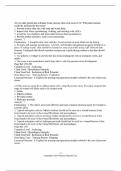
-
Gerontological Nursing, 4e (Tabloski) Chapter 12 The Integument
- Exam (elaborations) • 14 pages • 2024
-
- $10.99
- + learn more
Gerontological Nursing, 4e (Tabloski) Chapter 12 The Integument 1) An older patient has a subnormal body temperature and an infection. How does the nurse best describe this phenomenon? 1. The temperature regulating mechanism deteriorates with aging. 2. The patient's infection is improving with medication treatment. 3. The diagnosis of an infection is inaccurate and will be checked. 4. The temperature was obtained incorrectly and is inaccurate. Answer: 1 Explanation: 1. An ...
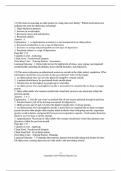
-
Gerontological Nursing, 4e (Tabloski) Chapter 7 Psychological and Cognitive Function
- Exam (elaborations) • 13 pages • 2024
-
- $10.99
- + learn more
Gerontological Nursing, 4e (Tabloski) Chapter 7 Psychological and Cognitive Function 1) During an interview, the nurse notes that an older patient is having mild difficulty with some words and forgets the names of people. The patient is alert, oriented to time, person, and place, and makes appropriate responses. What does the nurse determine this patient's cognitive changes to mean? 1. Normal signs of aging 2. Early symptoms of dementia 3. Indicators of depression in the elder...
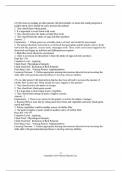
-
Gerontological Nursing, 4e (Tabloski) Chapter 20 The Gastrointestinal System
- Exam (elaborations) • 13 pages • 2024
-
- $10.99
- + learn more
Gerontological Nursing, 4e (Tabloski) Chapter 20 The Gastrointestinal System 1) An older resident is complaining of being constipated. Which action should the nurse take first when caring for this patient? 1. Assess the diet for adequacy of fiber and fluids. 2. Determine what the patient means by constipation. 3. Obtain an order for a laxative and an enema if needed. 4. Encourage the patient to increase fluid intake and activity. Answer: 2 Explanation: 1. Assessing the diet...
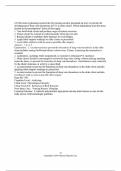
-
Gerontological Nursing, 4e (Tabloski) Chapter 21 The Hematologic System
- Exam (elaborations) • 23 pages • 2024
-
- $10.49
- + learn more
Gerontological Nursing, 4e (Tabloski) Chapter 21 The Hematologic System 1) Which clinical finding by the nurse is considered normal in the older adult client? 1. A hemoglobin of 10 g/dL two days post-joint replacement 2. Reports of the hands and feet feeling extremely warm 3. Skin tear with bruising, re-bleeding, and prolonged healing time 4. Poor or weak pulse amplitude in bilateral lower extremities Answer: 1 Explanation: 1. Red blood cell reserve and replacement is slower ...
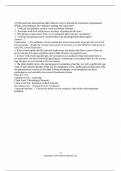
-
Gerontological Nursing, 4e (Tabloski) Chapter 16 The Respiratory System
- Exam (elaborations) • 22 pages • 2024
-
- $10.49
- + learn more
Gerontological Nursing, 4e (Tabloski) Chapter 16 The Respiratory System 1) Which respiratory system assessment finding of an older client does the nurse determine is most concerning? 1. Coughing during the night while sleeping 2. Purposefully sitting up straighter to get a deep breath 3. Shortness of breath when crossing a large parking lot 4. Three episodes of diagnosed bronchitis in twelve months Answer: 1 Explanation: 1. Coughing during sleep can be a sign of asthma, hea...

$6.50 for your textbook summary multiplied by 100 fellow students... Do the math: that's a lot of money! Don't be a thief of your own wallet and start uploading yours now. Discover all about earning on Stuvia


